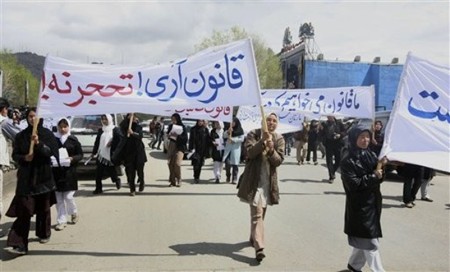(New York) – Afghanistan’s influential international supporters should insist that President Hamid Karzai act to amend the notorious law that formalizes discrimination against Shia women, Human Rights Watch said today.

Afghan Shiite women carry banners, one on left reads "Yes law, but no petrifaction," during a march against a new conservative marriage law in Kabul, Afghanistan on Wednesday, April 15, 2009. (Photo: AP)
Human Rights Watch learned today that the amended bill was published in the official Gazette on July 27, 2009 (Gazette 988), bringing the law into force.
“Karzai has made an unthinkable deal to sell Afghan women out in return for the support of fundamentalists in the August 20 election,” said Brad Adams, Asia director at Human Rights Watch. “So much for any credentials he claimed as a moderate on women’s issues.”
A copy of the final law seen by Human Rights Watch shows that many regressive articles remain, which strip away women’s rights that are enshrined in Afghanistan’s constitution. The law gives a husband the right to withdraw basic maintenance from his wife, including food, if she refuses to obey his sexual demands. It grants guardianship of children exclusively to their fathers and grandfathers. It requires women to get permission from their husbands to work. It also effectively allows a rapist to avoid prosecution by paying “blood money” to a girl who was injured when he raped her.
“The rights of Afghan women are being ripped up by powerful men who are using women as pawns in maneuvers to gain power,” said Adams. “These kinds of barbaric laws were supposed to have been relegated to the past with the overthrow of the Taliban in 2001, yet Karzai has revived them and given them his official stamp of approval.”
Karzai signed the Shia Personal Status Law in March, prompting a national and international storm of protest. The law regulates the personal affairs of Shia Muslims – who make up between 10 and 20 percent of the population – including divorce, separation, inheritance, and the minimum age for marriage. The initial version of the law included articles that imposed drastic restrictions on Shia women, including a requirement to ask permission to leave the house except on urgent business, and a requirement that a wife have sex with her husband at least once every four days.
The law was designed in secret by a powerful and hard-line Shia leader, Ayatollah Asif Mohseni, and supported by conservative Shia leaders in parliament. Many women activists have accused Karzai of abandoning his previous moderate views on women’s rights to help him secure votes in the presidential election.
In a rare move, Afghan women took to the streets in April to protest, braving threats and violence. President Barack Obama of the United States, Prime Minister Stephen Harper of Canada, Prime Minister Gordon Brown of the United Kingdom, the NATO secretary general, Jaap de Hoop Scheffer, and many other world leaders condemned the legislation. As a result of pressure, Karzai submitted the law to a consultation process with civil society groups in May, which resulted in some improvements. The legislation still contains some of its most repressive measures, though.
Human Rights Watch said that the law directly contravenes rights provided under the Afghan constitution, which bans any kind of discrimination and distinction between citizens of Afghanistan. Article 22 states that men and women “have equal rights and duties before the law.” The law also contravenes the Convention on the Elimination of All Forms of Discrimination against Women, to which Afghanistan is a party.
“Afghanistan’s parliament should overturn this law, and its constitutional court should throw out provisions that violate the constitution and its international legal obligations,” Adams said. “And the other presidential candidates should promise Afghan women that, if elected, they will make it a priority to amend or repeal this abhorrent law.”



